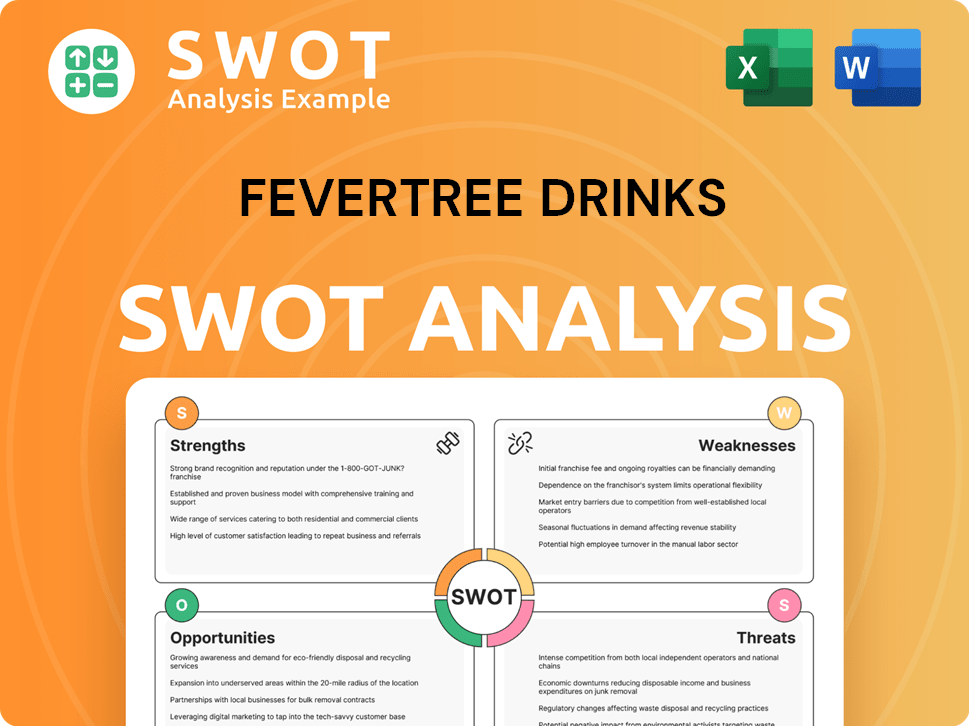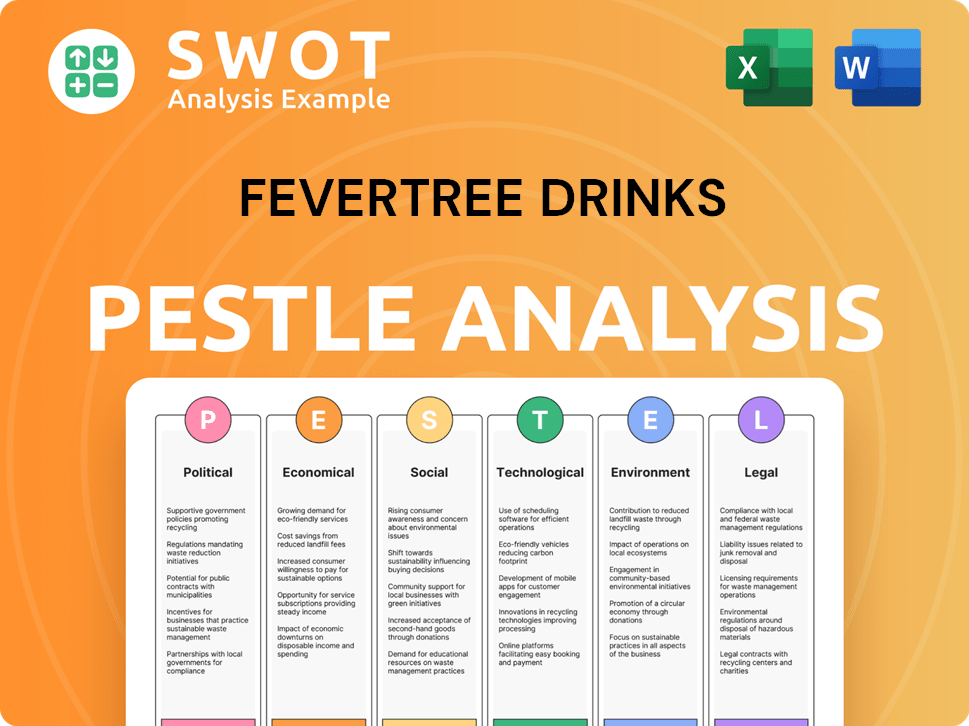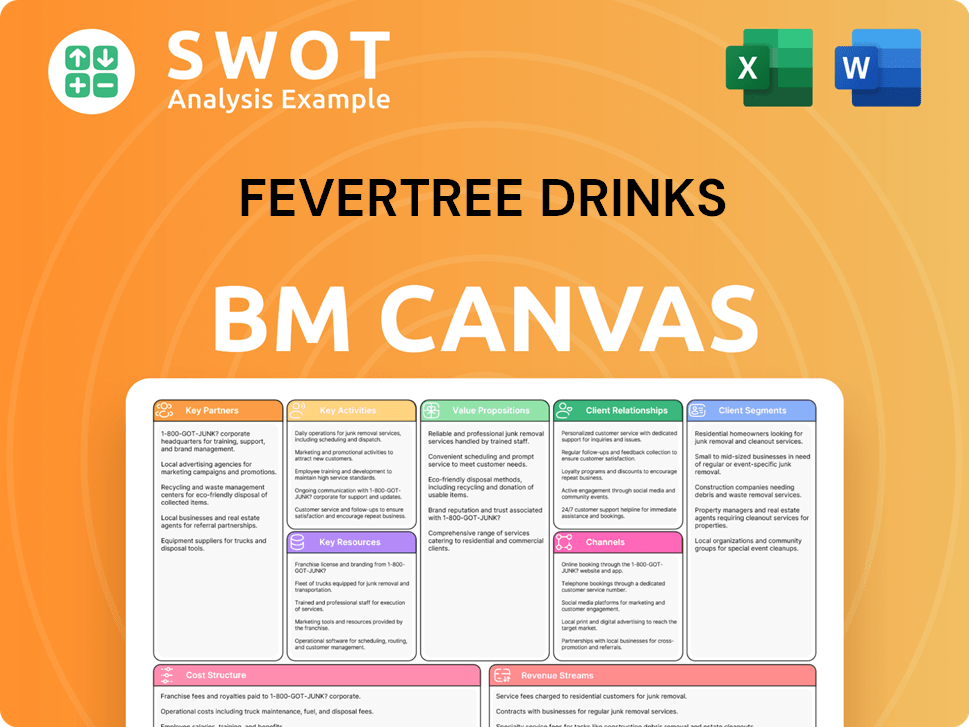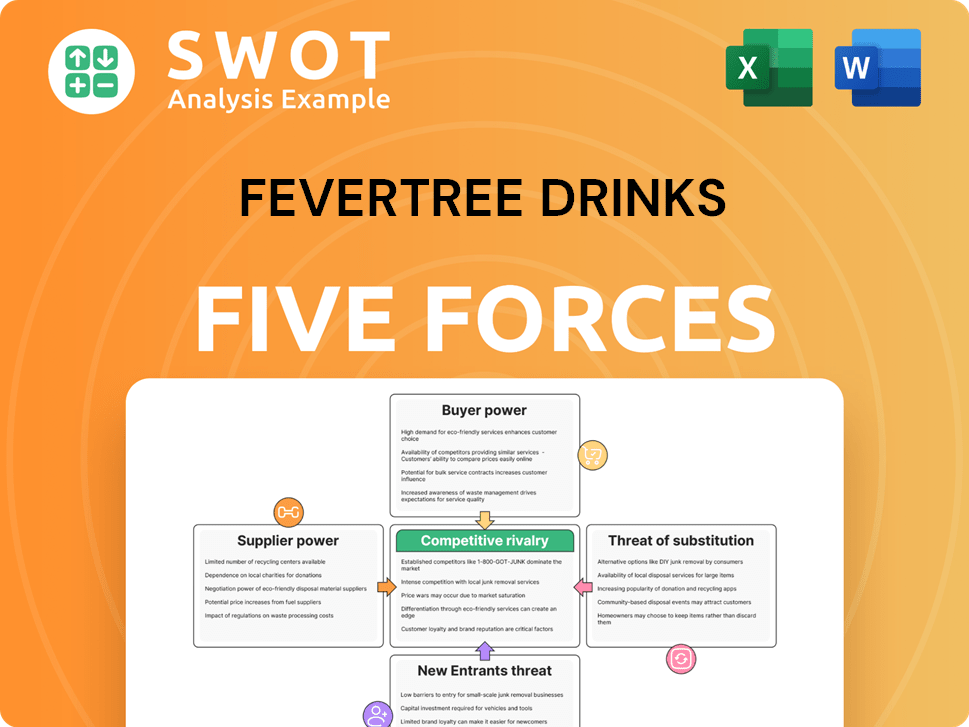Fevertree Drinks Bundle
Can Fevertree Maintain Its Dominance in the Premium Mixer Market?
The premium mixers market is booming, fueled by a global thirst for quality and natural ingredients. Fevertree Drinks Company has masterfully ridden this wave, establishing itself as a leader with its commitment to superior taste. But in a dynamic market, understanding the Fevertree Drinks SWOT Analysis is crucial to appreciating its strategic maneuvers and future prospects.

This exploration dives deep into the Fevertree competitive landscape, analyzing its position within the premium mixers market. We'll dissect the company's key Fevertree competitors and evaluate its competitive advantages, providing a comprehensive Fevertree market analysis. Understanding the carbonated soft drinks industry dynamics is key to understanding Fevertree's strategic moves.
Where Does Fevertree Drinks’ Stand in the Current Market?
The company, a prominent player in the premium mixers market, has established a strong market position. Its core operations revolve around the production and distribution of high-quality mixers designed to complement premium spirits. With a focus on natural ingredients and superior taste, it has successfully carved out a niche within the carbonated soft drinks industry.
The value proposition of the company centers on providing consumers with mixers that enhance the drinking experience. This focus on quality and taste has allowed the company to command a premium price point, differentiating it from mass-market competitors. The company's commitment to quality and its ability to meet the evolving preferences of consumers are key to its success.
The company holds a significant market share within the premium mixers market, particularly in the UK. In 2023, the company's revenue reached £344.4 million, demonstrating strong financial performance. This financial success is a key indicator of its strong market position and brand recognition.
The company's primary product lines include tonic waters, ginger ales, lemonades, and other complementary mixers. These products are designed to enhance premium spirits, catering to a consumer base that values quality and taste. The diverse range supports its premium brand positioning and market appeal.
The company has established a strong presence across Europe, North America, and Australia. Ongoing expansion into new international markets is a key part of its strategy. This global reach helps the company to diversify its revenue streams and increase its brand visibility.
The company focuses on penetrating both the on-trade (bars, restaurants) and off-trade (retail) channels. This dual approach ensures that its products are accessible to its target customer segments. The company's distribution strategy is a key factor in its ability to reach affluent consumers and cocktail enthusiasts.
The company's financial health and scale are generally robust compared to industry averages. For instance, in the first half of 2023, the company reported an adjusted EBITDA of £17.6 million, reflecting a significant increase from the previous year. While its global market share in the broader non-alcoholic beverage sector may appear smaller compared to multinational giants, its dominance within the premium mixer segment is undeniable. For more details on the customer base, consider reading about the Target Market of Fevertree Drinks.
The company's success is built on several key strengths that have solidified its position in the market. These include a focus on premium ingredients, a strong brand reputation, and effective distribution channels.
- Premium Brand Positioning: The company has successfully maintained a premium price point, reflecting the perceived value of its products.
- Strong Financial Performance: The company's revenue and profitability indicate a healthy financial position.
- Global Expansion: The company's presence in multiple international markets supports its growth strategy.
- Product Innovation: The company's ability to adapt to changing consumer preferences with new products.
Fevertree Drinks SWOT Analysis
- Complete SWOT Breakdown
- Fully Customizable
- Editable in Excel & Word
- Professional Formatting
- Investor-Ready Format

Who Are the Main Competitors Challenging Fevertree Drinks?
The Fevertree competitive landscape is characterized by a mix of established beverage giants and emerging brands, all vying for a share of the premium mixers market. This dynamic environment necessitates a keen understanding of both direct and indirect competitors, as well as the broader industry trends shaping the future of the carbonated soft drinks industry.
A thorough Fevertree market analysis reveals that the company faces challenges from various fronts, including well-entrenched players with extensive distribution networks and innovative new entrants. The competitive intensity is further heightened by the evolving preferences of consumers who are increasingly seeking high-quality, natural ingredients in their beverages.
Understanding the competitive dynamics is crucial for assessing Fevertree's position and its potential for growth. This involves evaluating the strategies, strengths, and weaknesses of key rivals, as well as the broader economic and market forces at play.
Direct competitors in the premium mixers market include brands that offer similar products and target the same consumer base. These rivals often compete on factors such as product quality, brand positioning, and distribution networks. Key players in this category include Schweppes and Britvic, as well as regional premium mixer brands like Q Mixers.
Indirect competitors consist of larger beverage companies that offer a broader range of soft drinks, some of which are used as mixers. These companies, such as Coca-Cola and PepsiCo, leverage their extensive distribution and brand recognition to reach a wide consumer base. Craft distilleries also pose indirect competition by developing their own mixers.
Schweppes, a long-standing brand, is a significant direct competitor. It has a well-established presence and widespread distribution. Schweppes has introduced premium lines to compete with Fevertree, aiming to regain market share. In 2024, Schweppes' parent company, Keurig Dr Pepper, reported a revenue of approximately $14 billion, demonstrating its substantial market power.
Britvic, which owns brands like Franklin & Sons, is another key competitor. Britvic is also positioned in the premium mixer space, competing directly with Fevertree. Britvic's revenue for the fiscal year 2024 was around £1.7 billion, indicating its strong position in the market.
Q Mixers is a regional premium mixer brand in the US that poses a direct challenge. It focuses on similar natural ingredient propositions as Fevertree. Q Mixers' market share in the US premium mixer segment has been steadily growing, reflecting its appeal to consumers.
Coca-Cola and PepsiCo are indirect competitors due to their extensive distribution and brand recognition. They offer a wider range of soft drinks, some of which are used as mixers. Coca-Cola's global revenue in 2024 was over $46 billion, and PepsiCo's was over $91 billion, highlighting their vast scale.
The competitive landscape is marked by battles for shelf space and on-trade prominence. Traditional players like Schweppes are investing in marketing and product innovation to regain market share. New entrants are disrupting the model with niche flavors and sustainable sourcing. Mergers and alliances could reshape the market if larger companies acquire smaller premium mixer brands.
- Product Innovation: Continuous development of new flavors and product lines to cater to evolving consumer tastes.
- Distribution: Expanding distribution channels to reach a wider consumer base, including both retail and on-trade establishments.
- Marketing: Implementing targeted marketing campaigns to enhance brand awareness and build consumer loyalty.
- Pricing Strategy: Adjusting pricing strategies to maintain competitiveness while preserving profit margins.
- Geographic Expansion: Expanding into new geographic markets to tap into growth opportunities.
Fevertree Drinks PESTLE Analysis
- Covers All 6 PESTLE Categories
- No Research Needed – Save Hours of Work
- Built by Experts, Trusted by Consultants
- Instant Download, Ready to Use
- 100% Editable, Fully Customizable

What Gives Fevertree Drinks a Competitive Edge Over Its Rivals?
The competitive advantages of the company are rooted in its brand equity, commitment to natural ingredients, and a strong distribution network. The company's brand has become synonymous with premium quality and sophisticated taste in the mixer category, fostering significant customer loyalty. This strong brand recognition allows the company to command a premium price point, differentiating it from more commoditized offerings. For a comprehensive understanding, exploring the Marketing Strategy of Fevertree Drinks can provide additional insights into their brand positioning and competitive approach.
A key differentiator is its unwavering focus on using high-quality, natural ingredients sourced from around the world. This commitment to natural ingredients resonates strongly with health-conscious consumers and those seeking authentic flavors. The company's strategic partnerships with leading spirit brands have also reinforced its position as the preferred mixer for high-quality alcoholic beverages. These advantages have evolved over time, with the company consistently investing in marketing and product innovation to maintain its premium image and expand its flavor portfolio.
The company's distribution network, particularly its strong presence in the on-trade channel (bars and restaurants), has been crucial to its success. By initially targeting premium establishments, the company gained credibility and exposure among discerning consumers, which then translated into off-trade (retail) growth. The company's ability to maintain these advantages hinges on its continued innovation, effective marketing, and ability to adapt to changing consumer trends and competitive pressures.
The company's brand is well-recognized and associated with premium quality. This strong brand recognition enables the company to maintain higher prices. The brand's reputation is a significant barrier to entry for new competitors in the premium mixers market.
The company sources high-quality, natural ingredients from around the world. This focus on natural ingredients appeals to health-conscious consumers. The sourcing strategy provides a unique selling point and differentiates the company from competitors.
The company has a strong presence in both on-trade and off-trade channels. The on-trade channel, including bars and restaurants, provides premium exposure. Strategic partnerships with leading spirit brands enhance distribution and brand visibility.
The company continually invests in product innovation and expands its flavor portfolio. New product development aligns with evolving consumer preferences. This commitment helps maintain a premium image and competitive edge.
The company's competitive advantages are multifaceted, including strong brand recognition, a commitment to natural ingredients, and a robust distribution network. These factors contribute to the company's ability to maintain a premium price point and differentiate itself in the market. The company's focus on high-quality ingredients, sourced globally, resonates with health-conscious consumers and those seeking authentic flavors, which is a key aspect of their success.
- Brand Equity: Strong brand recognition and association with premium quality.
- Natural Ingredients: Commitment to high-quality, natural ingredients sourced globally.
- Distribution Network: Robust presence in both on-trade and off-trade channels.
- Product Innovation: Continuous investment in new product development and flavor expansion.
Fevertree Drinks Business Model Canvas
- Complete 9-Block Business Model Canvas
- Effortlessly Communicate Your Business Strategy
- Investor-Ready BMC Format
- 100% Editable and Customizable
- Clear and Structured Layout

What Industry Trends Are Reshaping Fevertree Drinks’s Competitive Landscape?
The premium mixer industry is experiencing significant shifts, influencing the Fevertree competitive landscape. Key trends include a global rise in premium spirits, increasing consumer demand for natural ingredients, and a focus on sustainability. Technological advancements and evolving consumer preferences are also reshaping the market, presenting both challenges and opportunities for companies like Fevertree Drinks.
Understanding these industry dynamics is crucial for evaluating Fevertree’s market analysis and future prospects. The company faces challenges from growing competition and economic uncertainties, while also benefiting from the expansion of the premium spirits market and opportunities for product innovation and geographic growth. Analyzing these factors provides insights into the company's potential for sustained success.
The premium mixers market is driven by the premiumization of spirits, with consumers increasingly seeking high-quality mixers. Demand for natural ingredients and healthier options is growing, influencing product formulations. Sustainability and ethical sourcing are becoming significant factors in consumer purchasing decisions.
Increasing competition from established players and new artisanal brands poses a threat. Economic downturns and shifts in consumer spending can impact demand for premium products. Regulatory changes, such as those related to sugar content, can necessitate product reformulation.
Expansion in the global premium spirits market directly benefits companies like Fevertree. Emerging markets, particularly in Asia and Latin America, offer significant growth potential. Product innovation, such as functional mixers, opens new revenue streams, and strategic partnerships can enhance market reach.
Focus on product innovation and market expansion is vital for maintaining a competitive edge. Adapting to consumer preferences and exploring new distribution channels are crucial. A strong brand image and effective marketing campaigns are essential for success.
Fevertree’s future hinges on several key factors including its ability to innovate and adapt to changing consumer preferences. The company's success will depend on its ability to navigate increasing competition and economic uncertainties while capitalizing on growth opportunities in the global premium spirits market. Effective Fevertree marketing campaigns and brand positioning are also critical.
- Market Expansion: Expanding into new geographic markets, especially in Asia and Latin America, presents significant growth potential.
- Product Innovation: Developing new mixer categories and functional mixers can open new revenue streams.
- Strategic Partnerships: Collaborations with spirit brands and other beverage companies can enhance market reach.
- Distribution Channels: Exploring and optimizing distribution channels, including e-commerce and direct-to-consumer models, is essential.
For a deeper dive into the strategies that have fueled Fevertree's success, consider reading the Growth Strategy of Fevertree Drinks. The company’s ability to adapt to consumer preferences and explore new distribution channels will be crucial for its continued resilience and growth in the dynamic premium mixer industry.
Fevertree Drinks Porter's Five Forces Analysis
- Covers All 5 Competitive Forces in Detail
- Structured for Consultants, Students, and Founders
- 100% Editable in Microsoft Word & Excel
- Instant Digital Download – Use Immediately
- Compatible with Mac & PC – Fully Unlocked

Related Blogs
- What are Mission Vision & Core Values of Fevertree Drinks Company?
- What is Growth Strategy and Future Prospects of Fevertree Drinks Company?
- How Does Fevertree Drinks Company Work?
- What is Sales and Marketing Strategy of Fevertree Drinks Company?
- What is Brief History of Fevertree Drinks Company?
- Who Owns Fevertree Drinks Company?
- What is Customer Demographics and Target Market of Fevertree Drinks Company?
Disclaimer
All information, articles, and product details provided on this website are for general informational and educational purposes only. We do not claim any ownership over, nor do we intend to infringe upon, any trademarks, copyrights, logos, brand names, or other intellectual property mentioned or depicted on this site. Such intellectual property remains the property of its respective owners, and any references here are made solely for identification or informational purposes, without implying any affiliation, endorsement, or partnership.
We make no representations or warranties, express or implied, regarding the accuracy, completeness, or suitability of any content or products presented. Nothing on this website should be construed as legal, tax, investment, financial, medical, or other professional advice. In addition, no part of this site—including articles or product references—constitutes a solicitation, recommendation, endorsement, advertisement, or offer to buy or sell any securities, franchises, or other financial instruments, particularly in jurisdictions where such activity would be unlawful.
All content is of a general nature and may not address the specific circumstances of any individual or entity. It is not a substitute for professional advice or services. Any actions you take based on the information provided here are strictly at your own risk. You accept full responsibility for any decisions or outcomes arising from your use of this website and agree to release us from any liability in connection with your use of, or reliance upon, the content or products found herein.